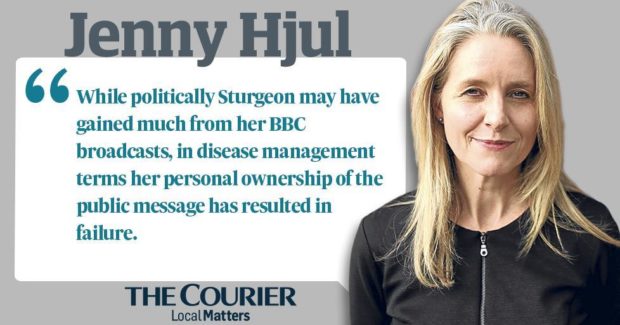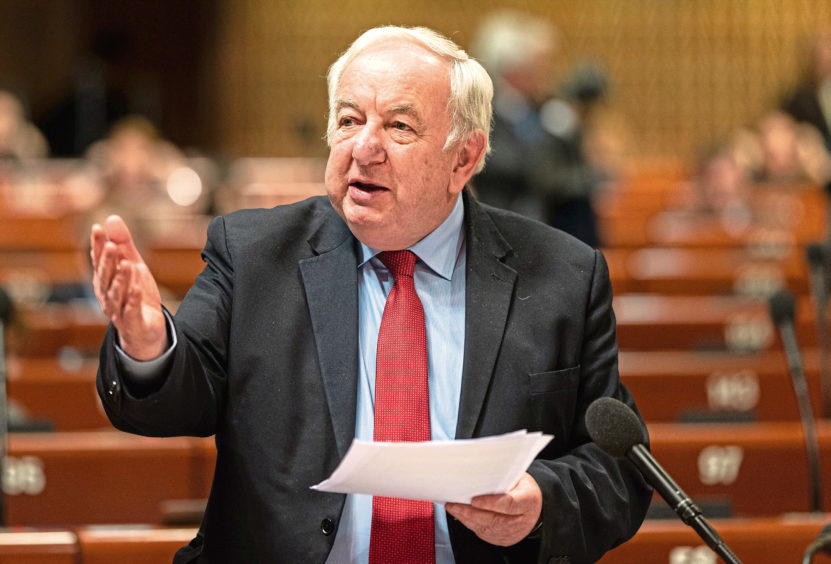A new attempt is being made to take Nicola Sturgeon off the air as the next Scottish parliamentary elections loom ever closer.
Labour peer George Foulkes has demanded Ofcom, the broadcasting watchdog, investigates whether the first minister’s daily Covid briefings breach BBC impartiality rules.
He is not suggesting the pandemic updates are stopped altogether, only that they should be presented by public health officials and not by politicians, who can use parliament for statements, as UK health secretary Matt Hancock does.
Sturgeon, he said, included “topics of a political nature, sometimes critical of the UK government, with no proper right of reply to the other parties”.
Of course, she denies her appearances before the press are politicised but there is plenty of evidence to suggest otherwise.
Brexit, for instance, comes up from time to time and so do comparisons with Westminster’s handling of the virus. That wouldn’t happen with an unpoliticised health official (if one could be found in Scotland).
And nor would a doctor or a virologist or an epidemiologist snap at reporters who question the thinking behind restrictions: Sturgeon does that a lot.
She bristled last week when a journalist from a newspaper she doesn’t like asked if she was picking on Edinburgh by keeping it in tier three against the scientific advice.
Getting a message across
But her chief excuse for featuring in every briefing is because this, she believes, is the only way to get the important messages across.
That doesn’t say much about her faith in her health team but it is a ploy she has used before, when BBC Scotland tried in the summer to limit its coverage.
Back then she said such a move would put messaging to older people at risk as they “don’t routinely go on the internet or watch things on their phone”.
The implication, that senior citizens wouldn’t be able to absorb news delivered by anyone other than the SNP leader, rather insults that generation’s intelligence.
But it worked and BBC Scotland was cowed into a U-turn, with the result that Sturgeon has not been off our screens since March.
With BBC bosses intimidated by what Lord Foulkes called “the overbearing attitude of the Scottish government”, opposition parties must now hope the regulator will stand up to the Nationalists.
An election advantage
If not, Sturgeon will go into May’s Holyrood election with the advantage of more than a year of party-political broadcasts behind her. These have helped boost her popularity, by giving her a platform to grandstand without parliamentary scrutiny.
She is provided with a much more benign reception than the one she would face from her political opponents, who have recently torn her to shreds over the veracity of her testimony in the Salmond inquiry.
She fends off a great many questions from local papers asking, quite understandably, very local questions. And neither the BBC nor STV would dare put anything even vaguely tricky to her.
She is then free to pontificate at length, and without challenge, about how she is suppressing the disease (not true) or doing better than England (not true) or acting in Scotland’s best interests, a highly subjective assertion.
‘Best performance in a Covid drama’
For good measure, there is usually a dash of personal angst, which she would not get away with in the parliament, but is invariably worthy of the Bafta for the best performance in a Covid drama.
Nothing about the production is accidental. Its timing, at lunchtime instead of in the evening like the (intermittent) UK briefings, is aimed at an audience most likely to be watching daytime television.
Her scaremongering has the greatest impact with people who may well be older, out of work, or vulnerable for other reasons.
Having petrified part of the population with claims about the disease’s transmission, she then morally scolds the rest of us in case we are tempted to defy her rules.
Failed public message
While politically she may have gained much from her broadcasts, in disease management terms her personal ownership of the public message has resulted in failure.
Apart from Scotland’s Covid outcome being proportionately worse than England’s, most people don’t even know what the Scottish government message is.
According to a poll, 80% of young people couldn’t identify in full Sturgeon’s coronavirus acronym, FACTS, and she has now had to relaunch her public health campaign in the run-up to Christmas.
On Monday she was back on the box, with a warning to anyone considering celebrating the festive period, albeit within the permitted constraints.
The best gift we can give family and friends, she said, was to “keep our distance”. Oh, that she would take her own advice and put a sizeable space between herself and the cameras, not just for Christmas but for the life of this parliament.




